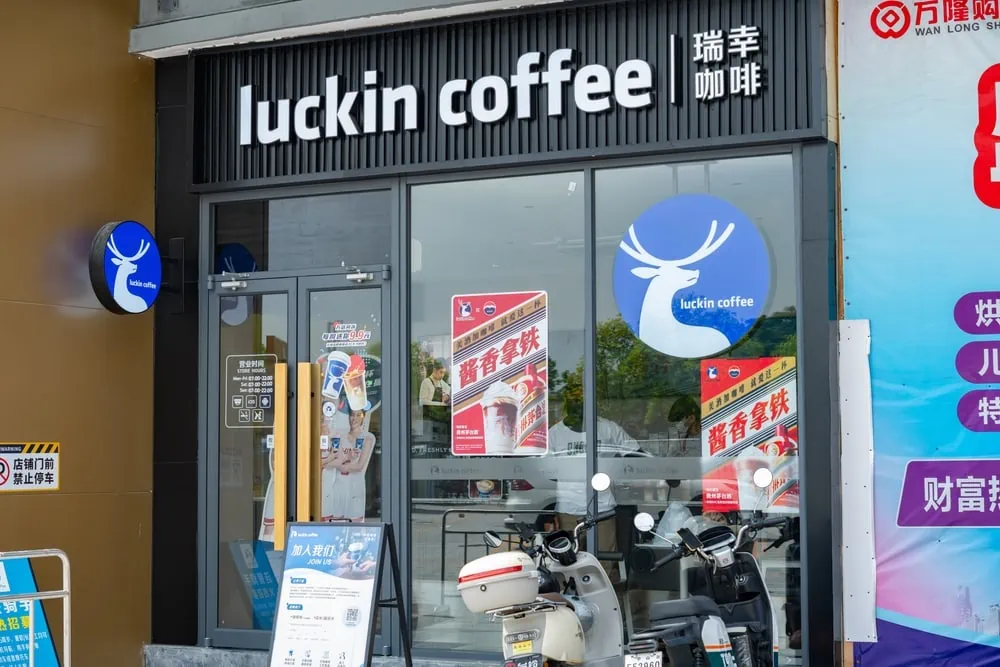The Chinese consumer market, ever vibrant and dynamic, has been making headlines again with a recent trend fusing baijiu with coffee and chocolate, writes Robynne Tindall
In September 2023, Chinese baijiu brand Kweichou Moutai, one of the world’s largest spirits companies, launched collaborations with Chinese coffee chain Luckin and international chocolate brand Dove that took the market by storm. What can other brands learn from these popular promotions?
Moutai x Luckin Coffee
Luckin Coffee launched a partnership with Moutai in early September, selling a baijiu-infused latte for RMB 38 (£4.27) per cup (although discounts usually made it around RMB 19). Despite many being sceptical of the coffee/baijiu mashup, consumers still flocked to Luckin in their millions. According to Luckin, 5.42 million cups of the coffee were sold on the first day of launch, with sales topping RMB 100 million (£11.2 million).
Founded in 2017, Luckin Coffee was a venture capital darling, leveraging ultra-cheap prices and quick delivery to win over Chinese consumers. The company took a hit in autumn 2020 after it admitted to fabricating over USD 300 million in earnings and was delisted from US markets, but has since bounced back with a vengeance, surpassing Starbucks in terms of income and number of stores by mid-2023.
Moutai x Dove
Moutai quickly followed up its Luckin partnership with a collab with Mars-owned Dove chocolate. The baijiu-filled chocolates launched on 16 September priced at RMB 35 (£3.95) for a box of two pieces or RMB 99 (£11.12) for a box of six, and sold out within minutes. Since then, unauthorised merchants have been flipping the chocolates on e-commerce platforms for several times the RRP. And the demand wasn’t just due to a trendy product drawing attention online; feedback from consumers was overwhelmingly in favour of the product, with some even suggesting making it a permanent addition to Dove’s offerings in China.
Analysis and implications
These collaborations indicate Moutai’s desire to broaden its market and appeal to a younger customer base. The strong spirit is traditionally associated with formal banqueting and 500ml bottles typically retail for upwards of RMB 1,500 (£168) a bottle, putting it out of the reach of many consumers.
However, the success of these collaborations isn’t just an indicator of Moutai’s willingness of to innovate; it also sheds light on the evolving tastes and preferences of Chinese consumers.
Young Chinese consumers have an experimental palate
The younger Chinese demographic, influenced by global trends yet deeply rooted in their cultural heritage, are always keen to sample new products and flavours, especially when they combine familiar elements in unexpected ways. This is especially true for low-priced products like soft drinks, sweets and savoury snacks, as the risk of purchasing them is significantly lower. Brands in the Chinese market must constantly look for ways to innovate and launch new products to stay relevant.
Guochao isn’t going anywhere
These collaborations also reflect the continuing relevance of the “guochao” trend. Guochao, which translates to “national trend” (or can be more eloquently translated as ‘China chic’) encapsulates the rise of brands that celebrate and promote Chinese cultural identity, as well as the growing popularity of home-grown Chinese brands. Moutai’s recent collaborations reflect both sides of this trend. On the one hand, the decision to partner with Luckin rather than Starbucks aligned well with Moutai’s identity as a Chinese company and resonated with the national pride of Chinese consumers. On the other hand, marrying Western favourites like coffee and chocolate with a traditionally Chinese spirit was a smart way to integrate global tastes with local preferences.
Co-branding is an important strategy
Co-branded partnerships have long been an effective way for high-end brands to connect with a broader consumer demographic. During CBBC’s 2023 China Consumer conference, Sarah Rotherham, CEO of Fontaine Group, which owns the fragrance brand Creed, described how Creed worked on a collaboration with Chinese rap artist Benzo, embedding the fragrance into one of his songs, and with Chinese art toy ROBBi, in which limited-edition collectables were scented using Creed fragrances and sold along with non-fungible tokens (NFTs).
In conclusion, brands aiming to thrive in China’s dynamic consumer landscape need to be attuned to evolving tastes, ensuring they strike the right balance between innovation and cultural sensitivity.




